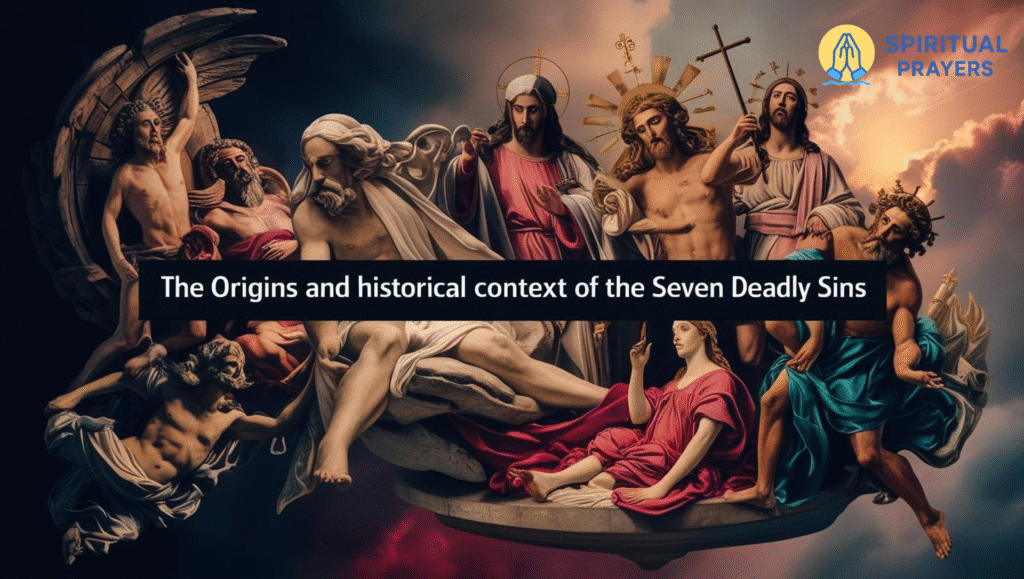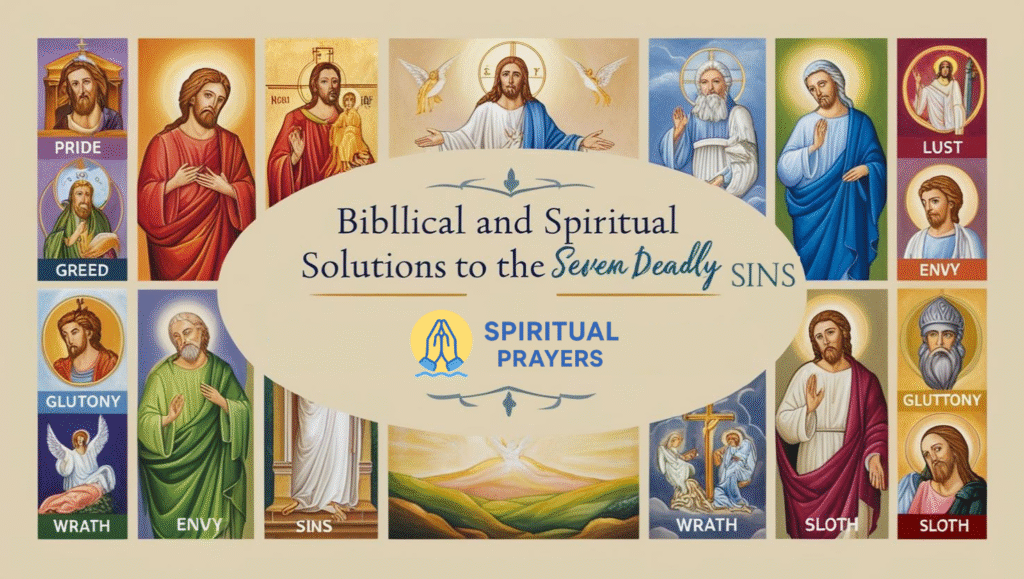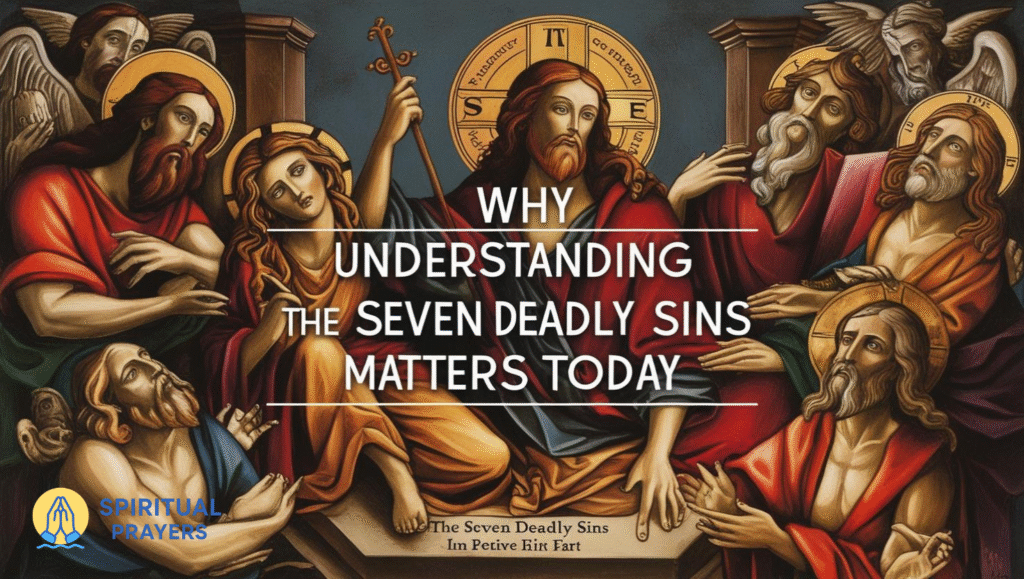
The Seven Deadly Sins—pride, greed, lust, envy, gluttony, wrath, and sloth—have shaped moral and spiritual discussions for centuries. Rooted in Christian theology, these sins are considered fundamental vices that lead individuals away from virtuous living. This article explores the origins, meanings, and modern relevance of the Seven Deadly Sins, offering practical insights into recognizing and overcoming them in daily life.
What Are the Seven Deadly Sins?

The Seven Deadly Sins, also known as the capital or cardinal sins, are a classification of vices that originated in early Christian teachings. Formalized by Pope Gregory I in 590 AD, they were later refined by theologians like Thomas Aquinas. These sins are deemed “deadly” because they are believed to give rise to other sins, creating a ripple effect of moral and spiritual harm. Unlike minor infractions, they represent deep-seated tendencies that disrupt one’s relationship with God, others, and oneself.
Each sin targets a specific aspect of human behavior, from excessive pride to destructive anger. Understanding their definitions and manifestations is key to addressing their influence. Below, each sin is explored in detail, including its historical context, biblical references, and practical examples.
The Origins and Historical Context of the Seven Deadly Sins

The concept of the Seven Deadly Sins emerged in the early Christian church as a way to categorize human failings. In the 4th century, monk Evagrius Ponticus listed eight “evil thoughts,” which were later adapted by Pope Gregory I into the seven sins we know today. These were intended as a moral framework to guide believers toward righteousness. By the Middle Ages, the sins were widely taught through sermons, art, and literature, such as Dante Alighieri’s Divine Comedy, which vividly depicted their consequences in the afterlife.
The sins were not arbitrary but rooted in biblical teachings. For example, Proverbs 6:16-19 lists behaviors detestable to God, including prideful eyes and a lying tongue, which align with the deadly sins. Over time, they became a universal tool for self-examination, influencing both religious and secular ethics.
Detailed Breakdown of Each Deadly Sin
1. Pride: The Root of All Sin
Pride, often considered the most severe of the Seven Deadly Sins, is an inflated sense of self-worth or superiority. It manifests as arrogance, self-centeredness, or taking credit for gifts that belong to God. In biblical terms, pride is condemned in Proverbs 16:18: “Pride goes before destruction, a haughty spirit before a fall.”
In modern life, pride appears in subtle ways: dismissing others’ opinions, seeking constant validation, or refusing to admit mistakes. For example, a manager who ignores team input to assert dominance may be driven by pride. Overcoming pride requires humility, which involves recognizing one’s limitations and valuing others’ contributions.
2. Greed: The Insatiable Desire for More
Greed is an excessive desire for material wealth or possessions, often at the expense of others. It’s condemned in Luke 12:15, where Jesus warns, “Watch out! Be on your guard against all kinds of greed.” Greed can manifest as hoarding resources, exploiting others for profit, or prioritizing wealth over relationships.
In today’s consumer-driven world, greed might look like compulsive shopping, unethical business practices, or an obsession with status symbols. To counter greed, cultivating generosity and gratitude can shift focus from accumulation to sharing.
3. Lust: Misguided Desires of the Flesh
Lust is an intense craving for sexual gratification outside the bounds of moral or relational commitment. Rooted in the commandment against adultery (Exodus 20:14), lust reduces others to objects of desire, undermining genuine intimacy. It can manifest as pornography addiction, infidelity, or objectifying behavior.
In a hyper-sexualized culture, lust is fueled by media and advertising. Combating lust involves fostering respect for others and redirecting desires toward meaningful connections. Practices like mindfulness and accountability can help manage impulses.
4. Envy: Resentment of Others’ Success
Envy is the resentment of another’s blessings, achievements, or qualities. It’s addressed in Galatians 5:26, which cautions against “envying one another.” Envy breeds bitterness and can lead to gossip, sabotage, or self-loathing.
Social media often amplifies envy, as curated lives spark comparisons. For instance, envying a colleague’s promotion might lead to resentment rather than motivation. Overcoming envy requires celebrating others’ successes and focusing on personal growth. Gratitude journaling can reframe perspectives.
5. Gluttony: Excess in Consumption
Gluttony is the overindulgence in food, drink, or resources, often to the detriment of health or fairness. Proverbs 23:20-21 warns against excess, linking it to poverty. Beyond overeating, gluttony includes wasteful consumption, like buying excessive goods.
In modern contexts, gluttony might appear as binge-eating, hoarding, or environmental overuse. Addressing gluttony involves moderation, mindful consumption, and prioritizing sustainability. For example, meal planning can curb overeating while reducing waste.
6. Wrath: Destructive Anger
Wrath is uncontrolled anger that seeks harm or vengeance. Ephesians 4:26 advises, “In your anger do not sin.” Wrath can manifest as verbal abuse, physical violence, or holding grudges. In daily life, it might look like road rage or online arguments.
Managing wrath requires emotional regulation techniques, such as deep breathing or pausing before responding. Forgiveness and empathy are powerful antidotes, allowing individuals to release anger without causing harm.
7. Sloth: Apathy and Inaction
Sloth is not just laziness but a spiritual apathy that neglects responsibilities or faith. Proverbs 19:15 links sloth to suffering. It can appear as procrastination, neglecting talents, or ignoring spiritual growth.
In a fast-paced world, sloth might manifest as disengagement from meaningful work or relationships. Combating sloth involves setting goals, prioritizing tasks, and nurturing discipline. Small, consistent actions, like daily prayer or exercise, can overcome inertia.
The Seven Deadly Sins in Modern Life

While rooted in ancient theology, the Seven Deadly Sins remain relevant today. They manifest in everyday scenarios: pride in social media boasting, greed in corporate scandals, or sloth in neglecting personal growth. Technology and consumerism often amplify these vices, making self-awareness crucial.
For example, the pressure to curate a perfect online image can fuel pride and envy, while fast fashion encourages gluttony and greed. Recognizing these patterns allows individuals to make conscious choices, aligning actions with values.
Biblical and Spiritual Solutions to the Seven Deadly Sins

Christian teachings offer virtues to counter each sin, often called the “Seven Heavenly Virtues”:
- Humility vs. Pride: Acknowledge dependence on God and others.
- Generosity vs. Greed: Share resources freely.
- Chastity vs. Lust: Pursue purity in thought and action.
- Kindness vs. Envy: Celebrate others’ blessings.
- Temperance vs. Gluttony: Practice moderation.
- Patience vs. Wrath: Respond with calm and forgiveness.
- Diligence vs. Sloth: Embrace purposeful action.
Scripture emphasizes repentance and grace as paths to overcoming sin. Ephesians 2:8-9 highlights salvation through faith, not works, offering hope for transformation. Prayer, reflection, and community support are practical steps to align with these virtues.
Practical Steps to Overcome the Seven Deadly Sins
Overcoming the Seven Deadly Sins requires intentional effort. Here are actionable strategies:
- Self-Reflection: Journal daily to identify patterns of pride, envy, or other sins. Ask, “Where did I act out of selfishness today?”
- Prayer and Meditation: Seek spiritual guidance to cultivate virtues. A novena, a nine-day prayer, can focus on specific sins.
- Accountability: Share goals with a trusted friend or mentor to stay committed.
- Mindfulness: Practice pausing before reacting to anger or temptation, allowing time for wiser choices.
- Community Engagement: Volunteer or participate in faith-based groups to foster generosity and kindness.
These steps, grounded in discipline and faith, can transform habits over time.
The Cultural Impact of the Seven Deadly Sins
The Seven Deadly Sins have left a lasting mark on culture, from medieval art to modern media. Paintings like Hieronymus Bosch’s The Seven Deadly Sins and the Four Last Things vividly depicted their consequences. In literature, Geoffrey Chaucer’s The Canterbury Tales explored their moral implications. Today, films like Se7en and TV shows use the sins as narrative frameworks, reflecting their enduring relevance.
These cultural depictions serve as reminders of the sins’ universal nature, encouraging introspection across generations. They also highlight society’s fascination with human flaws and redemption.
Why Understanding the Seven Deadly Sins Matters Today

The Seven Deadly Sins offer a timeless framework for examining human behavior. In a world of rapid change, they provide clarity on what drives destructive choices. By recognizing pride in self-promotion, greed in overconsumption, or wrath in conflicts, individuals can make deliberate changes to live with purpose and integrity.
Moreover, the sins remind us of shared humanity. Everyone grapples with these tendencies, but through faith, reflection, and effort, transformation is possible. This understanding fosters empathy and strengthens communities, aligning personal growth with collective well-being.